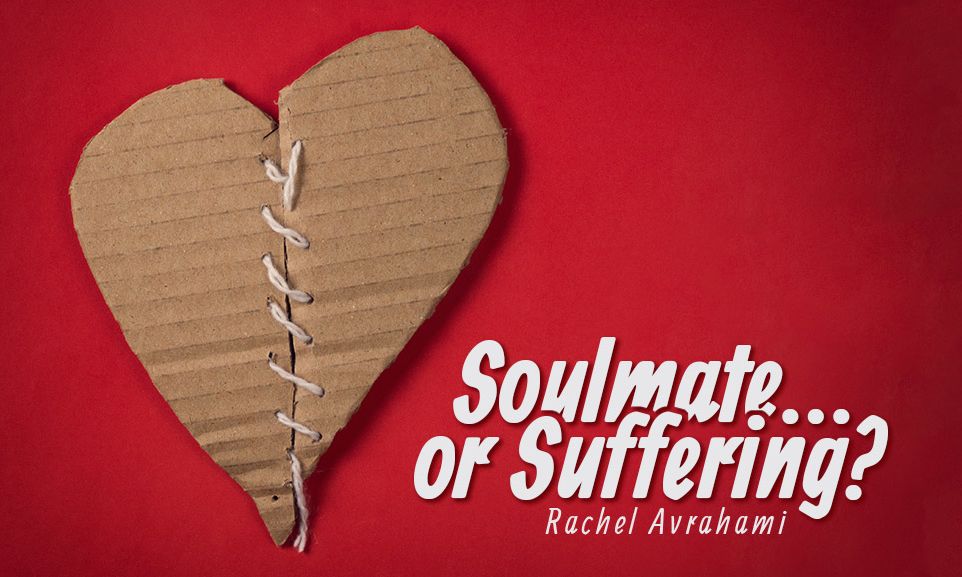
Soulmate… or Suffering?
A reader asks - how does Hashem determine who is happily married to their real soulmate, and who suffers with a miserable spouse? And what can you do to get the former and not the latter?

I am wondering if it is someone’s luck or mazal that determines if they marry and stay married – but not just to get married and be miserable but to be happily married, vs. someone who gets married and is miserable, what does that depend on, if anything? Is it prayer, luck, bracha… what do you think it could be?
Thank you,
JP, Brooklyn, NY
Very simple! I heard in the name of a hidden tzaddik–
If you get married and are happy, then this is your zivug hagoon, your true spiritual soulmate.
If you get married and are not happy, then this is a tikkun, a spiritual rectification. When you finish the tikkun you need to do with that person, then the relationship will either end or change – I know stories of both including a miracle story Rabbi Arush put in the book Say Thank You and See Miracles of someone who thanked Hashem for her abusive husband. He changed and stopped being emotionally abusive! Rabbi Arush said he would have been more prepared to believe that the stars and sun changed their course than that this guy changed, but he did.
So, with tikkun marriages there is nothing to do but cancel yourself (bitul atzmi) knowing that Hashem knows exactly what He is doing, and to say thank You for the tikkun, because if you knew what Hashem knows, you would be happy too! Don’t push the time or the situation. Otherwise, in refusing to accept Hashem’s will, such a person now pushes more suffering upon himself, G-d forbid…
There is no trading suffering! Hashem doesn’t want to make anyone suffer, but if someone doesn’t wake up with a nice wakeup call, He will throw whatever it takes at him to force him to wake up in an effort to save him. As Rebbe Nachman once said, “If you’re not prepared to suffer a little, be prepared to suffer a lot.”
Remember – this world determines your ETERNITY. Whatever difficulty or suffering Hashem sends to someone in this world is NOTHING compared to the suffering of tikkunim or sins that weren’t rectified once arriving in the Next World. The difficulties aren’t even comparable to the eternal loss of increased spiritual gain. Take the suffering of this world and RUN! THANK YOU H’ for saving me from THAT!
Rabbi Arush once yelled at the guys at the Yeshiva that anyone who got divorced – it’s 100% your fault! You weren’t supposed to get divorced. You were supposed to do your work and you failed. Take The Garden of Peace and The Garden of Purity and get to work!!!
For the women, I highly recommend reading Women’s Wisdom since it contains important pearls of advice both for people dating and for people already married. Especially if a woman is, G-d forbid, suffering in a marriage already, it is critically important to read the sections on divorce in the book. While generally Rabbi Arush is strongly anti-divorce, there are important exceptions and the advice in those chapters are critical in order to properly ascertain what to do. Be very cautious though in looking for advice and make sure to find someone who knows and follows Rabbi Arush’s path in dealing with these issues – unfortunately, I personally know of far too many sob stories.
It’s also important to note that Rabbi Arush brings that according to the Kabbalah, a husband and wife always have to have some difficulty in their marriage. Even if they work hard on a particular issue and resolve it, some other difficulty will spring up because making peace between man and wife involves lofty spiritual rectifications.
Furthermore, even with all the work the husband and wife put in and must put in, ultimately, it’s a gift from Hashem. Men and women are polar opposites, like oil and water. Making peace between them is a miracle even in the best of cases! This is why it’s so important for them to pray for marital peace and be very strong in their personal holiness and modesty in order for Hashem to dwell between them.
Rabbi Arush says that this rule of personal holiness’ influence on the souls applies even before marriage. From the youngest age a child must know that he or she has one soulmate and guard themselves very well in all matters of holiness in order not to “cheat” on that soulmate. In fact, it’s even a segula – the more holy the couple is, the faster and easier they find each other, because holiness brings the souls together while immodesty and immorality (G-d should save us) drive them apart.
And if personal holiness is important while searching for a soulmate, it’s even more important when married. Literally, everything depends on it! Income, children, you name it. It is of utmost importance that Hashem’s presence feels comfortable dwelling in the home, bringing blessing and serenity with it. Hashem hates immorality, because it’s truly repulsive and disgusting. Having a television or unfiltered internet in the house is like having an open sewer hole – not only does all the good go right down the drain but the place stinks!
Hence, although a lot is out of our hands, it’s all in Hashem’s hands and by doing the right things we can make married life a lot sweeter.
***
Rachel Avrahami grew up in Los Angeles, CA, USA in a far-off valley where she was one of only a handful of Jews in a public high school of thousands. She found Hashem in the urban jungle of university. Rachel was privileged to read one of the first copies of The Garden of Emuna in English, and the rest, as they say, is history. She made Aliyah and immediately began working at Breslev Israel.
Rachel is now the Editor of Breslev Israel’s English website. She welcomes questions, comments, articles, and personal stories to her email: rachel.avrahami@breslev.co.il.
***
If you also have a “Say Thank You and See Miracles” story you would like to share, please send it to us! Stories may be posted on our website anonymously and sent to Rabbi Arush.
Please email rachel.avrahami@breslev.co.il with your story.







Tell us what you think!
Thank you for your comment!
It will be published after approval by the Editor.